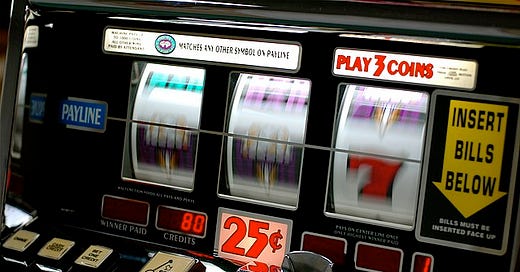SCOUTING YESTERDAY: Statewide crackdown on gambling included pinball machines, juke boxes
This week in South Dakota history: Nov. 22-28
A raid by the Codington County sheriff and city police on the Watertown American Legion Club resulted in the seizure of four “one-armed bandits” and charges of illegal possession of slot machines, The Daily Plainsman reported on Nov. 26, 1948.
Codington County State’s Attorney R.F. Manson said he would bring charges against each machine, which could bring a maximum fine of $2,000. The raid was part of a statewide crackdown on illegal gambling.
South Dakota Attorney General Sigurd Anderson held a conference for state’s attorneys in May of 1947, according to the Lead Daily Call, in which he advised that state gambling laws must be enforced. To be considered gambling, three elements were necessary: chance, consideration and reward.
After reviewing the state’s gambling laws, Assistant Attorney General Ed Barron advised that there was no distinction between charitable organizations and businesses operating for profit — all forms of gambling were illegal under then-state law.
Following the meeting, Lawrence County Sheriff J.O. Twiford issued a warning to all establishments in the county that gambling of any kind would not be allowed. The warning advised against slot machines, juke boxes in bars, pinball machines, punchboards and any other gambling equipment.
“Even churches and their bingo games had better watch their step,” the sheriff was quoted as saying.
Sioux Falls and Minnehaha officials agreed to cooperate with every policy outlined by the Attorney General, according to the Argus Leader. On Oct. 15, 1947, six Sioux Falls establishments were raided, with charges of illegal gambling and selling liquor without a license brought against 13 individuals. Trial witnesses testified that widespread gambling was present throughout the city.
Witness J.I. Goldhagen provided a list of several Sioux Falls businesses providing liquor and gambling, many located near City Hall. Goldhagen testified he had visited Look’s Café and saw a dice table, Ace’s Pool Hall where as much as $27 exchanged hands over one game of pool, and that he had seen children ages 10 to 15 playing pinball at the Sport Bowl on North Philips Avenue where sometimes as many as 50 games were located.
In 1949, a bill was defeated in the state house that would have provided a legal work-around for unlicensed gambling, according to the Rapid City Journal. The measure sought to remove penalties placed on State’s Attorneys who failed to enforce the gambling laws, which included fines ranging from $100 to $500, 30 to 90 days in jail and forfeiture of office.
South Dakota continued to shutdown gambling in the state wherever it was found until 1970 when South Dakota Attorney General Gordon Mydland reversed the state’s stance on pinball. In an official opinion, Mydland said free or extended play were not “a thing of value, but is merely doing a useless thing free.” It would still be illegal, however, to cash out credits earned during play.
Keep reading with a 7-day free trial
Subscribe to The Dakota Scout to keep reading this post and get 7 days of free access to the full post archives.








